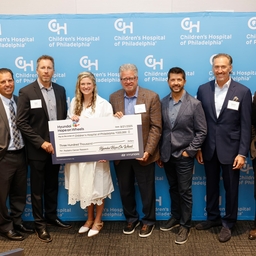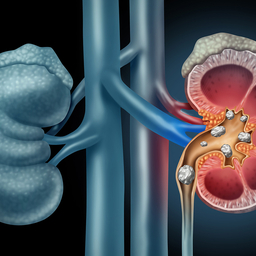Research News from CHOP

Promising New Preclinical Therapy Offers Hope in the Development of Precision Medicine Treatments for Aggressive Cancers
CHOP researchers developed CDX0239-PBD, a novel antibody-drug conjugate that demonstrates exceptional effectiveness against cancers expressing the ALK protein, achieving durable tumor responses in preclinical models. This breakthrough could pave the way for new precision medicine treatments, enhancing patient outcomes and reducing the side effects associated with existing therapies.

Children’s Hospital of Philadelphia’s Dr. Haley Newman Awarded Hyundai Hope on Wheels Young Investigator Grant
Dr. Haley Newman, an attending physician with the Cancer Center at Children's Hospital of Philadelphia (CHOP) received the Young Investigator Award from Hyundai Hope on Wheels at a recent ceremony with her peers and patients. She received a $300,000 grant which will aid in vital research for pediatric cancer.
Donors Join Forces to Support Center for Microbial Medicine at Children’s Hospital of Philadelphia
Today Children’s Hospital of Philadelphia (CHOP) announced funding to support the recently launched Center for Microbial Medicine. This pioneering initiative is made possible by three transformative gifts from the McCausland and Salata families (through the McCausland Foundation), the Chappell Culpeper Family Foundation and another generous donor. Together, their support totals $13 million.
Researchers Find Potential Neurodevelopmental Outcomes Linked to Brain Tissue Differences in Newborns Exposed to HIV
Researchers at Children’s Hospital of Philadelphia (CHOP) in collaboration with the Botswana Harvard Health Partnership identified measurable differences in brain tissue patterns between newborns exposed to HIV during pregnancy but not infected and those with no HIV exposure.
Children’s Hospital of Philadelphia Researchers Find that Missing Messenger RNA Fragments Could be Key to New Immunotherapy for Hard-to-Treat Tumors
A new study, led by researchers CHOP, identified tiny pieces of messenger RNA that are missing in pediatric high-grade glioma tumors but not in normal brain tissues. Preclinical research indicates that these missing RNA fragments can make difficult-to-treat tumors more responsive to immunotherapy. The findings were recently published in the journal Cell Reports.
Study Uncovers Critical Connections Between Neighborhood Violence, Youth Aggression and Perceived Access to Firearms
A new study by the Center for Violence Prevention (CVP) at Children’s Hospital of Philadelphia, in collaboration with principal investigator Jungwon Min, PhD, MS from the University of Pennsylvania School of Nursing.

Children’s Hospital of Philadelphia Researchers Lead Largest Comparative Study of Surgical Interventions for Children and Adolescents with Kidney Stones
Researchers at Children’s Hospital of Philadelphia (CHOP), along with several academic partners, announced the primary results of the Pediatric KIDney Stone (PKIDS) trial, the largest comparative effectiveness study of surgical interventions for children and adolescents with kidney stones.
Preclinical CAR-T Studies Offer Foundation for Safer, More Effective Solid Pediatric Tumor Treatments
Researchers at Children’s Hospital of Philadelphia revealed insights into optimizing chimeric antigen receptor T cell (CAR-T) therapy for solid pediatric tumors, offering a more complete understanding of how tumor biology and immunological barriers affect efficiency and safety.

Cardiac Grants Propel Cutting-Edge Research to Transform Outcomes for Children with Severe Heart Conditions
The Cardiac Center at the Children’s Hospital of Philadelphia (CHOP) is leading pioneering research with grants aimed at improving outcomes for children with severe cardiac conditions. These efforts represent a comprehensive approach to advancing cardiac care from prenatal stages through childhood, potentially transforming treatment paradigms.
Children’s Hospital of Philadelphia Researchers Demonstrate How Genetic Interactions in Down Syndrome Disrupt Blood Cell Development
Researchers at Children’s Hospital of Philadelphia (CHOP) are shedding light on how two genetic factors – an extra copy of chromosome 21 (trisomy 21) and mutations in the GATA1 gene – interact to derail early blood cell development.